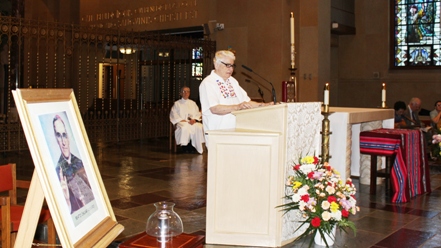
More than 350 people gathered at the Queen of Apostles Chapel at the Maryknoll Mission Center in Ossining, New York, for a Mass to celebrate the beatification of Oscar Romero, Archbishop of El Salvador this past Saturday, May 23, 2015. Archbishop Romero was assassinated while celebrating Mass in the hospital Church of the Divine Providence in San Salvador on March 24, 1980.
Archbishop Romero holds a special place in the hearts of Maryknollers, particularly those who came to know him and draw strength from him during their service in Central America, as well as because of two Maryknoll Sisters, Sisters Ita Ford and Maura Clarke, and Lay Missioner Jean Donovan, who prepared for mission with Maryknoll, all of whom were killed because of their work with the poor in El Salvador, just months after Romero’s murder.
The Maryknoll chapel resounded with song and prayers of thanksgiving, both in English and Spanish as well as with cries of “Viva Romero,” for the courageous life of this gentle man of prayer. The celebration was presented by the Maryknoll Fathers and Brothers, Maryknoll Sisters, Maryknoll Lay Missioners and Maryknoll Affiliates.
Archbishop Romero’s commitment to social justice, which cost him his life, was of great importance to all Maryknoll missioners, both during his lifetime as well as today. Through our combined efforts in overseas Catholic mission, Maryknoll as a whole continues to work for social justice and, like Romero, to be a voice for the poor in Latin America, as well as other nations around the world.
At the homily of the Mass, Romero’s last radio sermon, given the day before his assassination, was read both in English and again in Spanish. In this sermon he called on the soldiers of the army to refuse to obey orders given them to carry out the torture, rape and killing of their own countrymen, but to obey the law of God –“Thou shalt not kill”! He said, “No soldier is obliged to obey an order against the law of God.” The next morning he was shot. His last words were, “May God have mercy on the assassin.”
Oscar Romero was named Archbishop of El Salvador in 1977 with the approval of the wealthy conservative population of his country and its government, little realizing that he would soon become the champion of those they were oppressing – the Poor.
It was the murder of his friend, Rev. Rutilio Grande, the first priest to be killed for aiding poor ‘campesinos’, that awakened Romero to what was actually happening in El Salvador from the perspective of the victims. He announced that he refused to take part in any government ceremonies while the assassins were not brought to justice. A diocesan legal aid office was opened to document the murders and disappearances of victims and to aid families who were brutally affected. He became the “Voice of the Voiceless” fearlessly using the archdiocesan radio, naming on radio those victims who had suffered atrocities and those who were their persecutors.
Romero changed his whole way of ministering by going to the people in the barrios and countryside, listening to them and daring to denounce a government and society whose “economic systems we benefit from, built on the backs of the poor.” He was living out the “OPTION FOR THE POOR” promulgated by the Latin American Bishops Conference at Medellín, Colombia in 1968 and today by Pope Francis in his exhortation, “Joy of the Gospel”.
The Archbishop’s courage and audacity in opting for the poor led him to his death, which he fully recognized and accepted as following in Christ’s footsteps. When friends tried to persuade him to have protection his response was, “Why should the shepherd have protection when his sheep are still prey to wolves?” He was accused of being a Marxist and siding with terrorists. Threats became more intense, but this deeply spiritual man would not be silenced. He spoke against violence committed by both sides – right and left – and pleaded for “dialogue, social justice for the poor, human rights for all Salvadorans and the practice of compassion.” He said, “I don’t want to be ‘anti’ against anybody. I simply want to be the builder of a great affirmation: the affirmation of a God who loves us and wants to save us.”
